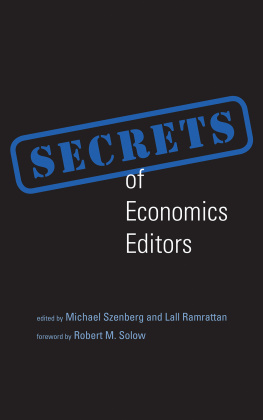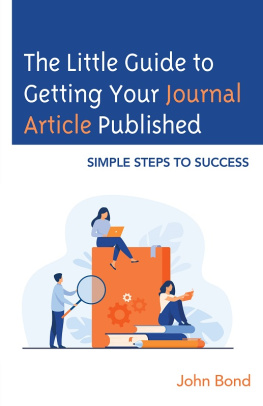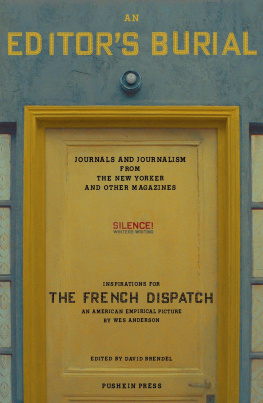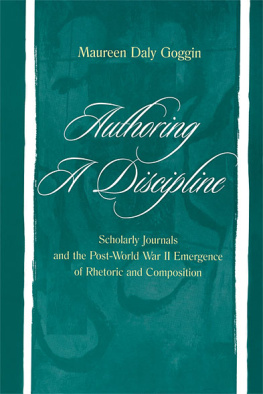Secrets of Economics Editors
Secrets of Economics Editors
edited by Michael Szenberg and Lall Ramrattan
The MIT Press
Cambridge, Massachusetts
London, England
2014 Massachusetts Institute of Technology
All rights reserved. No part of this book may be reproduced in any form by any electronic or mechanical means (including photocopying, recording, or information storage and retrieval) without permission in writing from the publisher.
Library of Congress Cataloging-in-Publication Data
Library of Congress Cataloging-in-Publication Data
Secrets of economics editors / edited by Michael Szenberg and Lall Ramrattan ;foreword by Robert M. Solow.
p. cm.
Includes bibliographical references and index.
ISBN 978-0-262-52546-6 (pbk. : alk. paper)
ISBN 978-0-262-32012-2 (retail e-book)
1. EconomicsPeriodicals. 2. Editing. 3. Editors. I. Szenberg, Michael. II. Ramrattan, Lall, 1951
HB1.S43 2014
070.44933dc23
2013020994
10 9 8 7 6 5 4 3 2 1
d_r1
BH
Dedicated to the memory of my sister, Esther, for bringing me to these shores;
to the memory of my father, Henoch, for his wisdom;
to my mother, Sara, for giving birth to metwice;
to my children, Naomi and Avi, and
their spouses, Marc and Tova;
to my grandchildren,
Elki and Chaim, and Chanochi, Batya, Chanoch, Devorah, Ephraim, Ayala, and Jacob;
and to my wife, Miriam
And to the righteous, anonymous Austrian-German officer who took my immediate family to a hiding place just days before the last transport to Auschwitz, where most of my family perished
In Memoriam
To my late elder sister, Balwanty Deolall,
and my brother Deonarine Ramrattan,
who have always directed me on the traditional path
Foreword
Robert M. Solow
I would have made a lousy journal editor. At the simplest level, these essays demonstrate convincingly that editing an economics journal is a formidable managerial project. Hundreds of submissions arrive each year. They have to be channeled to appropriateknowledgeable but not too opinionatedassociate editors and referees. In turn, the referees have to be nudged, cajoled, and flattered into producing fair and useful reviews, preferably in finite time. And records have to be kept every step of the way: where is each paper now, when did it get there, what has been received about it? The editor cannot afford to be caught in ignorance of the state of the system. To make it harder, some journals are owned by interfering publishers who know an inelastic demand when they see one. As for me, I could not manage my way out of a paper bag. Maybe that is why no one ever asked me to edit a journal.
All this is without mentioning the authors of those hundreds of papers. Their behavior was once summarized for me by a former editor of the American Economic Review (AER). He said that he could afford to accept about one in every ten papers submitted, and in so doing he created nine enemies and one ungrateful wretch.
Editors do much more than merely manage a flow of papers. Any reader of these essays will be struck by the seriousness with which these editors approach their task. They tend to know a lot about different area of economics and to care about the discipline and the profession. They think about the dual role of learned journals as records of ideas and research results and also as guarantors of intellectual quality, purveyors of a sort of Good Housekeeping Seal of Approval.
They also have to worry whether they are presiding over a dying industry that is on the verge of being rendered obsolete by online publishing and the ubiquity of the Web. Anyone attentive enough to have observed what has been happening over the years to the waistline of the AER and the Quarterly Journal of Economics (QJE), for example, will wonder about that. Maybe it is just another aspect of general obesity, but maybe it is a sign of vitality. By contrast, I can remember how much I used to enjoy the old Review of Economic Studies, not only because it was alive and interesting but also because it came out only three times a year with just a handful of articles and a lot of white space on every page.
There is a subtler question that surfaces occasionally in the book and on which there are natural differences of opinion and practice. Editors, like other economists, may have strong views on methodological and substantive issues that are currently the source of controversy within the research community. Is it proper for an editor to favor papers that support his or her side of the dispute? Or the majority view? Or is it the editors responsibility to see that the contents of the journal more or less reflect the distribution of opinion in the profession at large?
I can see valid arguments on both sides. One can maintain that editors are not chosen to be powerful protectors of whatever paradigm they happen to favor. They, or rather their journals, should be neutral, accepting or rejecting papers purely on the basis of merit. This is easier said than done: every partisan knows that giving the correct answer is a necessary if not sufficient sign of merit. An alternative view might say that no one wants monolithic journals, a little attitude makes for interesting reading, and since there is virtually free entry into the journal business, no serious work is likely to be excluded from publication. A thousand flowers can bloom without all blooming in the same journal. This is no trivial matter: promotion and tenure decisions often turn, for better or worse, on who published how many articles in which journals. (This saves senior members the trouble of actually reading the articles.) The current mainstream will naturally classify any dissenting journal as inferior, worth fewer tenure points (and sometimes the mainstream is right). Maybe it is a toss-up, but whichever way a journal goes, it should be up-front and explicit. Right now, I would say that the publication cards are stacked in favor of whatever the current fashion may be.
Maybe this book ought to be the first in a series. It could be an enlightening window into the sociology of knowledge to compare the practices and experiences of editors in economics with those in other fieldsother social sciences, some natural sciences, history, philosophy. Here is one example. In the economics departments I knew well, the choice of a thesis topic was left to each student, almost as a rite of passage. In, say, chemistry departments, as I understand it, many or most doctoral students attach themselves to somebodys expensive laboratory, and they essentially carry out a piece of Professor Xs project. Because many journal articles must arise from thesis research, this kind of institutional/cultural difference will affect what editors do and how they respond. There may be a reason for this difference in approach. It has sometimes seemed to me that in some sciences there is usually a well-defined set of unsolved problems waiting for a solution, not quite as well defined as a powerful mathematical conjecture looking for a proof but more in that direction than is usually the case in economics. If so, those sciences would function more like a group effort than economics does and perhaps be more cumulative, and the work of journal editors would somehow reflect this difference.
That is just one train of idle speculation set off by the chapters of this book. When I first saw the manuscript, I wondered who would want to read the reflections of a bunch of journal editors. Then I thought of the answeranyone who ever edited a journal, served as an associate editor, refereed a paper, wrote and submitted a paper, or read an article and wondered why it was in the journal. Thats just for starters.
Preface and Acknowledgments
Next page








